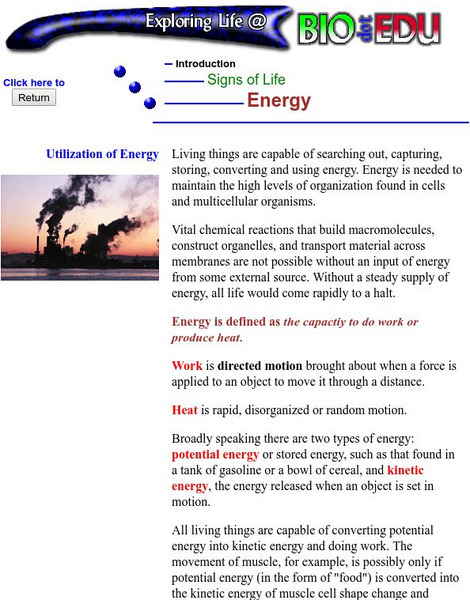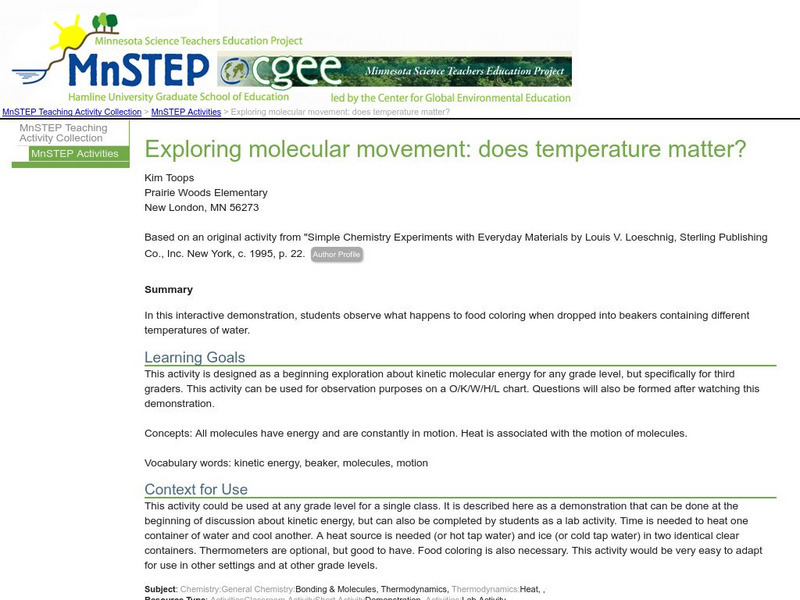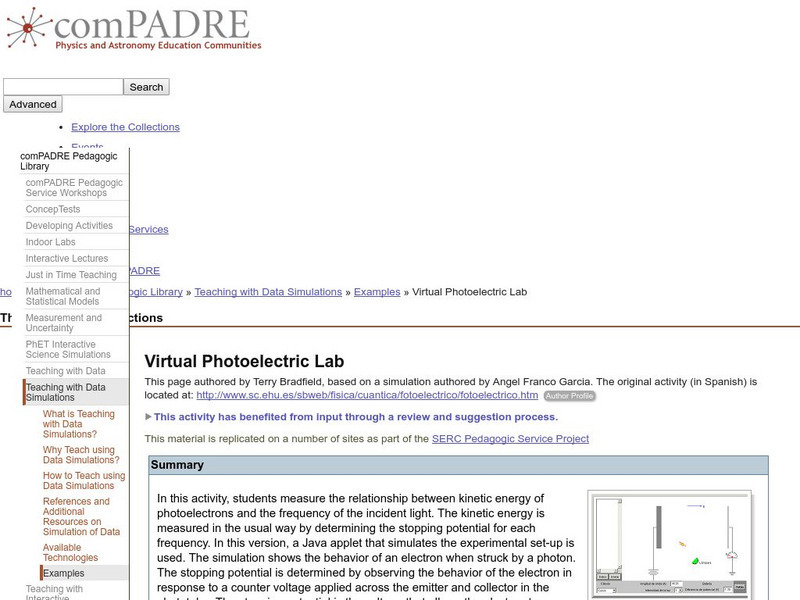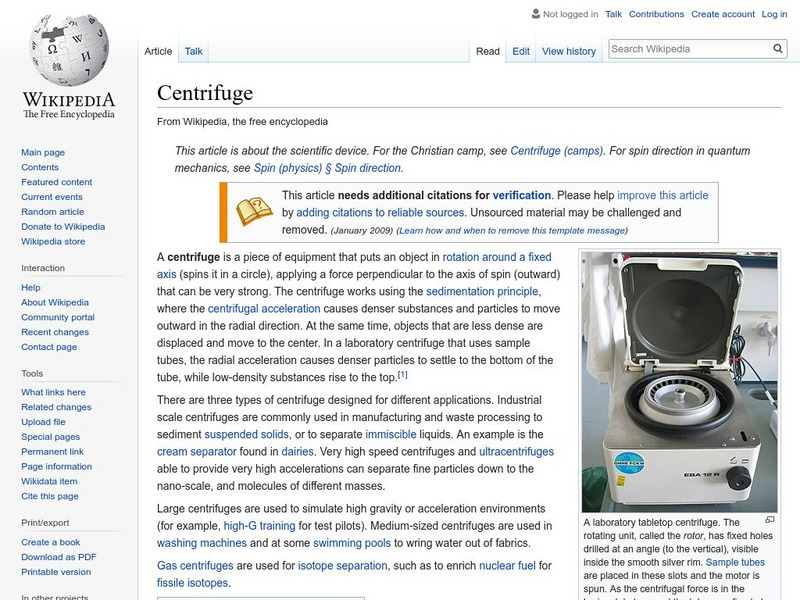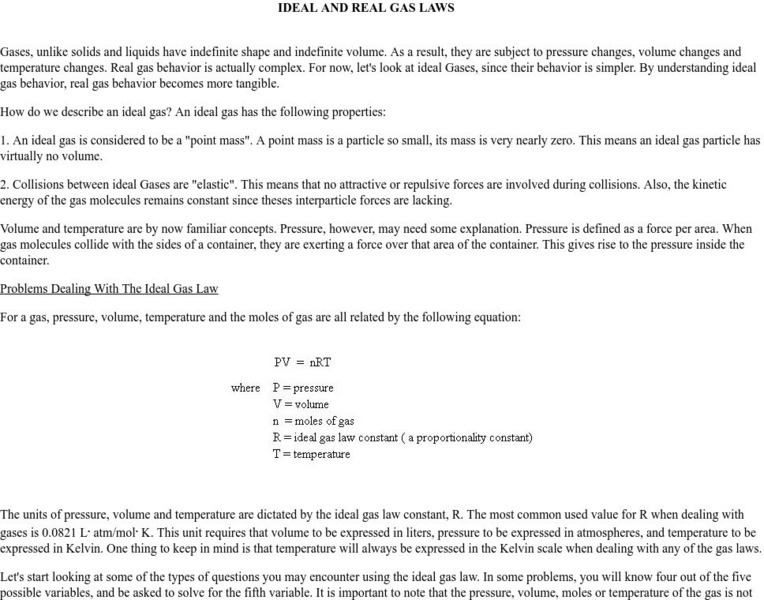CK-12 Foundation
Ck 12: Forms of Energy
[Free Registration/Login may be required to access all resource tools.] In this online lesson students will investigate examples of kinetic and potential energy and their transformations.
CK-12 Foundation
Ck 12: Temperature
[Free Registration/Login may be required to access all resource tools.] In this interactive tutorial students will learn the physics definition of temperature, how temperature is measured and how to convert the units of temperature...
Science Buddies
Science Buddies: How Long Will My Sleepy Yo Yo Sleep?
Yo-yo's are a fun toy and there is nothing simpler than a string wrapped between two connected disks. But there's a lot of physics that makes a yo-yo work. In this science fair project, learn more about how and why a yo-yo works. You...
The Tech Interactive
The Tech Museum of Innovation: Save the Hiker [Pdf]
Can you build a device that will deliver life-saving treatment to someone in a hazardous situation? During this instructional activity, students will learn how energy is converted and transferred between objects. Working in groups and...
Science Buddies
Science Buddies: Balloon Car
Students will design, build, and race balloon-powered cars in this fun lesson that teaches about engineering design and kinetic and potential energy.
Science Buddies
Science Buddies: Paper Roller Coasters: Kinetic and Potential Energy
In this lesson, your students will learn about kinetic and potential energy as they build their own roller coasters from simple classroom materials.
Science Buddies
Science Buddies: Teaching Engineering Design With an Egg Drop
Learners build a device to protect an egg and prevent it from breaking when dropped.
Open Ed
Open Ed Sci: 8.1 Contact Forces
In this unit, students explore a variety of phenomena to figure out, "Why do things sometimes get damaged when they hit each other?" Student questions about the factors that result in a shattered cell phone screen lead them to...
Massachusetts Institute of Technology
Mit: Open Course Ware: Force and Potential Energy
The activity investigates conservation of energy. Some topics explored are friction, kinetic energy, conservation of energy, and potential energy. The resource consists of video clips, lecture notes, practice problems, and exam...
City University of New York
Energy: Characteristics of Life
An explanation of types of energy, how living things use energy and how they can convert energy forms. This is a good, basic, start to studying this characteristic of life.
Georgia State University
Georgia State University: Hyper Physics: Relativistic Energy
A mathematically understandable presentation of relativistic energy. Parts include Relativistic Energy, Rest Mass Energy, Conservation of Energy, Pair Production, Relativistic Kinetic Energy, and even Kinetic Energy. A couple of...
Energy for Sustainable Development
Esd Bulgaria: Kids & Energy: Seven Energy Principles
Outlines the seven main principles of energy.
NASA
Nasa: Innovative Engines
NASA's Glenn Research Center reports on its innovative engines program, namely ion propulsion, a technology that once only powered imaginary spacecraft in science fiction novels. It is now a reality.
Science Education Resource Center at Carleton College
Serc: Investigating Kinetic Theory: An Inquiry Into the Ideal Gas Law
When an overturned beaker is placed on top of a birthday candle in shallow pan of water, the candle will first go out and then water will appear to creep up the sides of the beaker like magic. Student will hypothesize and investigate why...
Science Education Resource Center at Carleton College
Serc: Maximizing Kinetic Energy: An Investigation Using Marbles
Using marbles to construct a marble run, learners will learn about projectile motion, kinetic energy, potential energy, final velocity, and forces.
Science Education Resource Center at Carleton College
Serc: Exploring Molecular Movement: Does Temperature Matter?
In this interactive demonstration, students observe what happens to food coloring when dropped into beakers containing different temperatures of water.
Science Education Resource Center at Carleton College
Serc: Virtual Photoelectric Lab
In this activity, students measure the relationship between kinetic energy of photoelectrons and the frequency of the incident light.
Science Education Resource Center at Carleton College
Serc: Com Padre: Introduction to Work and Energy: The Hopper Popper Surprise
This activity will provide students with a qualitative understanding of the Work-Energy Theorem, especially on how the energy transferred depends on the distance over which the force is applied.
Museum of Science
The Atom's Family: Radiometer
Help Dracula find out about light waves by using a virtual radiometer.
Wikimedia
Wikipedia: Absolute Zero
Wikipedia offers several paragraphs of detailed information on absolute zero, the lowest temperature that can be obtained in any macroscopic system.
Wikimedia
Wikipedia: Centrifuge
Wikipedia provides detailed information and history on centrifuges in scientific research and industry, including its importance in making nuclear weapons.
FT Exploring
Ft Exploring: What Type of Energy Is It?
How many types of energy are there? Are there many forms of energy, such as electrical, mechanical, and chemical? Or are there really just two types of energy - kinetic energy and potential energy? Here you can learn about these...
Open Curriculum
Open Curriculum: Simplifying the Energy Zoo
Physics students find out how to effectively define and clarify kinetic and potential energy.
Towson University
Towson University: Ideal and Real Gas Laws
The ideal gas law is stated and explained at this site from the Towson University. It is then used to derive the other gas laws (Charles, Boyle's, Gay-Lussac's, Avogadro's, combined, etc.). Other gas law relationships are discussed....




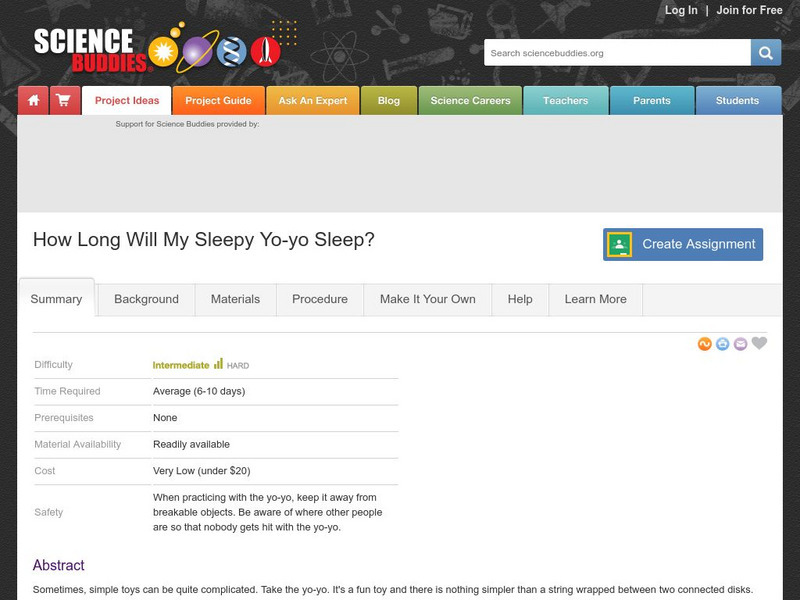
![The Tech Museum of Innovation: Save the Hiker [Pdf] Lesson Plan The Tech Museum of Innovation: Save the Hiker [Pdf] Lesson Plan](https://d15y2dacu3jp90.cloudfront.net/images/attachment_defaults/resource/large/FPO-knovation.png)

